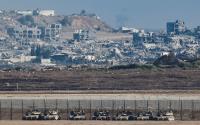June 4, 2003by Ira Chernus
36 years ago, this week, Israel conquered the West Bank and Gaza. That changed everything in the Middle East-except the deep-seated fear underlying Jewish life. Until that fear begins to lift, there is little hope for Middle East peace.
The number 36 has a very special meaning in Judaism. 18 is the number that symbolizes "life." So 36 is twice life, or two lives. The Zionist movement and the state of Israel have indeed lived two lives, one before June, 1967, and the other after that fateful time. Before June, 1967, Jews in Israel and around the world viewed ourselves as a tiny vulnerable minority. We had good reason to be afraid. We had spent nearly two millennia without a state, an army, or any way to protect ourselves. In our powerlessness, we were easy to victimize, and far too often we were victims.
In 1948, we gained a state, an army, and means of self-protection. But before 1967, we still had reason to feel insecure. Our state was still a fledgling. Its army was obviously capable, but not fully proven in battle. All of its neighbors were publicly its enemies, and they seemed intent on doing Israel harm. Most of the Palestinians were under the control of those neighbors, posing an unpredictable threat.
In just six days, in June, 1967, all that changed. Israel showed itself by far the most powerful nation in the Middle East. The enmity of its neighbors no longer mattered, for there was clearly nothing those neighbors could do on the battlefield to harm Israel. The Jewish state had proven itself and was there to stay. It had begun its second life, its life as the Middle East's superpower.
Israel now had a new problem, one that Jews had not faced in more than two millennia: What to do with a whole nation and its territory, taken as the spoils of war? How to be secure as a conqueror and occupier? After 1967, Israel had to answer these questions. It had to figure out how to use its unchallenged power. That is why the era since 1967 marked a brand new life for Israel and Zionism.
The last 36 years have shown that Israel has not solved this most urgent problem. Why does it seem so insoluble? The basic answer is that most of Israel's Jews, and most Jews around the world, have never believed or understood the way our collective life changed in 1967. They are still living in the old life.
The Six Day War's impact on the Jewish community was just the opposite of what logic would expect. We showed our preeminent power, yet most of us continue to live as if our power were still unproven and uncertain. We showed how secure we are, yet most of us feel and act as if we were less secure than ever. Our most common shared story of the war is not about a new triumphant confidence. It is about yet another proof of the same old vulnerability and threat.
There are many reason for this paradoxical reaction. Some day, serious historians of the Jews in the late 20th century will write whole books about it. For now, the essential point is not to explain the paradox but simply to recognize it. Most Jews, in Israel and elsewhere, still base their Jewish worldview and identity on the belief that we and our state are vulnerable, threatened, and insecure, simply because we are Jews.
Readers sympathetic to Israel may very well object: "Hey, why shouldn't Israeli Jews feel insecure? Their great victory in 1967 has not stopped the seemingly endless stream of attacks upon them by their enemies."
This objection shows how Jewish perception has failed to match the changing reality. It assumes that nothing has changed in two millennia, that Jews are still bound to be victims and there is nothing we can do about it. After 1967, there was plenty we could have done about it. Israel was in charge of Palestinian life. When its policies were more lenient, Palestinian violence and support for violence declined. When its policies were harsh, violence and support for it went up.
Israel's new-found control over its own destiny was one fundamental fact of the second, post-'67 Jewish life. The other fundamental fact was that most Israelis failed to recognize their own power and control. Indeed most Jews, in Israel and around the world, continue to believe that we are destined to be victims, and there is nothing we can do about it. This belief is the main barrier on the road to Middle East peace and therefore to a secure Israel.
The recent Israeli elections epitomized the problem. The hard-line leader, Ariel Sharon, defeated a genuine peace candidate because a majority of the voters let their fears override their hopes. This does not mean that the government or the people who support it are evil. It means they are terribly misguided. They are living in the insecurities of the past. Because they are so misguided, they are caught in the clutches of a fear that shapes their whole lives. Therefore, they block their own path to a more secure future.
(The same could be said of the United States. But more on that another day.)
Israel and its supporters could now start a third life, if only they would acknowledge that they do have power, that they are in charge, that their own actions, more than anything else, determine whether or not they will continue to be victims of violence. The words of the great Jewish philosopher Martin Buber, spoken to the Zionist Congress many years ago, are now truer than ever: "It depends on us whether we appear before the awakening Orient as hated agents and spies or beloved teachers and creators."
If Jews would recognize their power and stop the finger-pointing blame game, we could reach out to the Palestinians as genuine peacemakers. But first, Jewish perception and belief must finally catch up with the reality that began in 1967.
Ira Chernus is Professor of Religious Studies at the University of Colorado at Boulder. [email protected]






